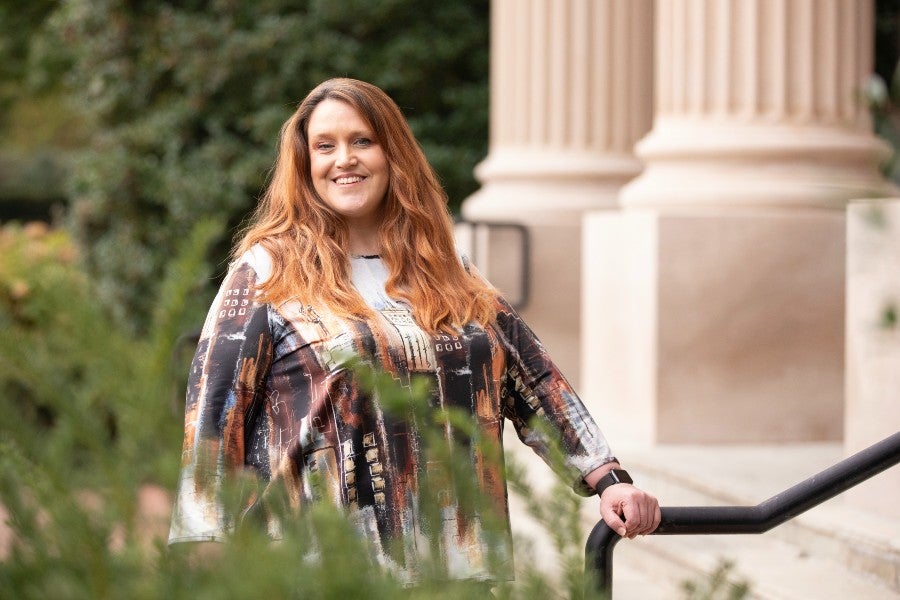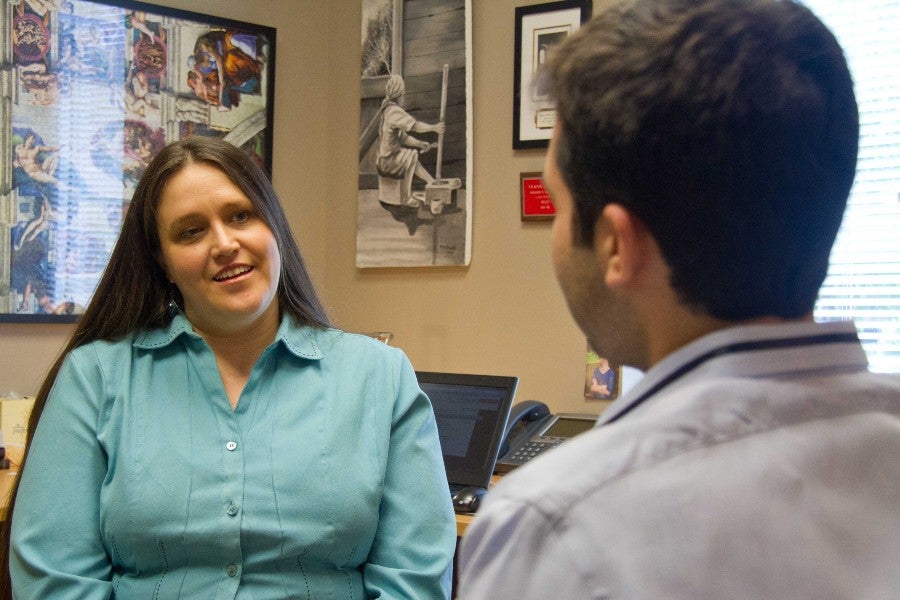First Honors College graduate impacts lives at Lipscomb every day
Associate Dean Shanna Ray came-and stayed-at Lipscomb for the relationships.
From Staff Reports |

You may know her as the longtime chair of Lipscomb’s department of Psychology, Counseling, and Family Science, or today, as Executive Associate Dean of the College of Liberal Arts & Sciences, but in 1993 Shanna Ray (’93) was a Lipscomb student herself and the first student to graduate from Lipscomb’s Honors College program.
For our new alumni newsletter, it seemed fitting to reflect back on the career of Ray, the first person to complete all the requirements for graduating from the honors program.
It was the personal relationships with Lipscomb faculty that she forged in just her freshman year, says Ray, that not only directed her lifelong career in psychology but also drew her back to become faculty at Lipscomb, to establish the same close, mentoring relationships with its students since 2002.
Ray arrived at Lipscomb in 1990 with the intent of majoring in biology and chemistry, but her life changed forever when she took her first honors course, Introduction to Psychology with Paul Turner, professor of psychology at the time. She smiles when she reflects on the fond memories of her first class with only about 20 students in the honors courses at Lipscomb in the early 1990s.
“The sense of community was strong because everyone in honors was in the same general education courses and helped each other study hard to get through,” said Ray.
One of her best friends was the president of the Honors Council. They had General Chemistry and Organic Chemistry together. “We made it through Dr. Paul Langford’s lecture and Dr. [Ronnie] Boone’s labs together. Dr. Boone had a dry sense of humor that surprised us sometimes,” said Ray. She remains friends with her lab buddy all of these years later.
LEARN MORE: See a video of Shanna Ray graduating in 1993
Ray credits the honors program’s small class sizes with her ability to develop impactful relationships with her professors.
Two retired honors professors, Paul Prill and Turner have become lifelong friends and mentors in supporting her career. Turner started out as her academic advisor, and helped her decide on a graduate school, as well as becoming the person who first hired her back at Lipscomb to teach in psychology. When he retired from chair of the department, he recommended Ray to carry the baton and subsequently wrote her recommendation for the position she now holds as executive associate dean.
“This was a lifelong mentoring relationship which began in the classroom my freshman year at 18 years old,” said Ray.
Prill, the beloved retired director of the Honors College for 20 years, taught the honors-level Introduction to Communications course Ray took her freshman year. Prill also became a mentor, and she was a team member on his Habitat for Humanity mission trip in Robbins, Tennessee. Still, to this day, when she sees Prill on campus or at any of the Honors College events, she always gets a hug.
“He is the person who reminds me of where I began and what is really important,” she said.
Ray became the first Lipscomb honors graduate because she graduated early, in December of 1993. Because of her early graduation, she was not going to be able to complete all of the Honors College requirements, but the original program director, Jerome Reed, worked it out so that she could take an independent study and write a paper to fulfill the last credit requirements.

She was inspired to enter academia herself by these close relationships with Lipscomb’s faculty members.
After Ray completed her education with a master’s from Middle Tennessee State University (1996) and a doctorate from Vanderbilt University (2002), she started at Lipscomb in 2002 as an instructor in psychology, advanced to chair of the department in 2005, helped co-found the Lipscomb’s graduate programs in psychology and counseling in 2007 and became an associate dean in 2022.
Her honors thesis on religiosity and perceptions of assertiveness in women completed in 1993 paved the way for her research interests throughout her career. She was published in Psychology of Religion and Spirituality in 2015 and presented at the Society for the Scientific Study of Religion in 2016, among other research accomplishments.
Other research interests include diversity in any realm: gender diversity, racial diversity, international student diversity and age/development level diversity. She has also been published in: Cognitive Development, Child Development, and Developmental Psychology and presented at the Association for Psychological Science, the National Conference on Health and Domestic Violence and the International Society of Traumatic Stress Studies Annual Conference.
The community at Lipscomb–the same thing that drew her to choose the university in the first place–is what keeps her grounded at Lipscomb, she said. The support she enjoys, especially as a woman who loves science and research, has touched her heart. She has found colleagues and mentors at Lipscomb who value her assertiveness, which allowed her to advance.
Through the years, the honors section of Lipscomb’s Introduction to Psychology course was among her favorite classes to teach, she said. She fondly remembers her bright honors students in those classes who were always excited to participate, came to class prepared and engaged in lively and profound discussions, she said.
Today, even in her administrative role, she still advises students who are much like herself when she began in Lipscomb Honors, enjoying “their intelligent discussions and ambitious plans.”